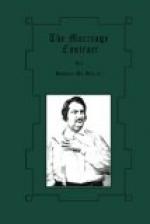Madame de Maulincour departed, having plunged Paul into a state of extreme perplexity. His mother-in-law a sly cat! Must he struggle for his interests in the marriage contract? Was it necessary to defend them? Who was likely to attack them?
He followed the advice of his aunt and confided the drawing-up of the marriage contract to Maitre Mathias. But these threatened discussions oppressed him, and he went to see Madame Evangelista and announce his intentions in a state of rather lively agitation. Like all timid men, he shrank from allowing the distrust his aunt had put into his mind to be seen; in fact, he considered it insulting. To avoid even a slight jar with a person so imposing to his mind as his future mother-in-law, he proceeded to state his intentions with the circumlocution natural to persons who dare not face a difficulty.
“Madame,” he said, choosing a moment when Natalie was absent from the room, “you know, of course, what a family notary is. Mine is a worthy old man, to whom it would be a sincere grief if he were not entrusted with the drawing of my marriage contract.”
“Why, of course!” said Madame Evangelista, interrupting him, “but are not marriage contracts always made by agreement of the notaries of both families?”
The time that Paul took to reply to this question was occupied by Madame Evangelista in asking herself, “What is he thinking of?” for women possess in an eminent degree the art of reading thoughts from the play of countenance. She divined the instigations of the great-aunt in the embarrassed glance and the agitated tone of voice which betrayed an inward struggle in Paul’s mind.
“At last,” she thought to herself, “the fatal day has come; the crisis begins—how will it end? My notary is Monsieur Solonet,” she said, after a pause. “Yours, I think you said, is Monsieur Mathias; I will invite them to dinner to-morrow, and they can come to an understanding then. It is their business to conciliate our interests without our interference; just as good cooks are expected to furnish good food without instructions.”
“Yes, you are right,” said Paul, letting a faint sigh of relief escape from him.
By a singular transposition of parts, Paul, innocent of all wrong-doing, trembled, while Madame Evangelista, though a prey to the utmost anxiety, was outwardly calm.
The widow owed her daughter one-third of the fortune left by Monsieur Evangelista,—namely, nearly twelve hundred thousand francs,—and she knew herself unable to pay it, even by taking the whole of her property to do so. She would therefore be placed at the mercy of a son-in-law. Though she might be able to control Paul if left to himself, would he, when enlightened by his notary, agree to release her from rendering her account as guardian of her daughter’s patrimony? If Paul withdrew his proposals all Bordeaux would know the reason and Natalie’s future marriage would be made impossible.




